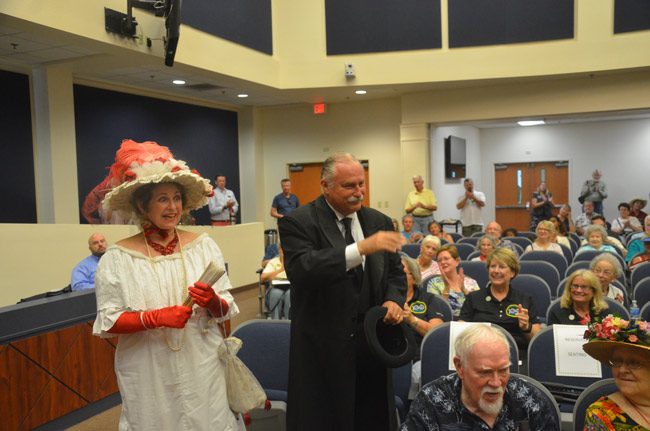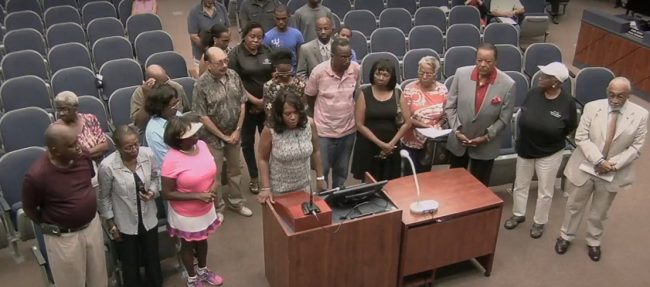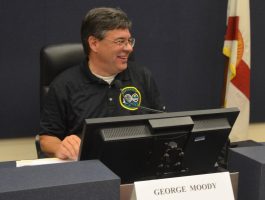
For Flagler County’s centennial Saturday and Monday, it wasn’t just celebration, though there was plenty of that. It was also acknowledgement and atonement in the strongest language issued from the County Commission for the county’s creation “during an era of racial divide and social ignorance that was hindered by incomplete notions of humanity.”
There was pageantry of course. Six hours of celebration Saturday at the Government Services Building in Bunnell featured a parade-worthy car show, a 1-mile fun run and walk (you’ve come a long way, baby), a dozen vendors with food and fun, live performances bringing to life Henry Flagler and his second wife Lily, and reenactments of the first county commission and school board meetings which, a large audience that included Sen. Bill nelson throughout discovered, were as stupefyingly dull then as they are today.
But the most moving moment of the two days was also its least scripted or hyped. It took place this morning during the regular County Commission meeting, as Commission Chairman Nate McLaughlin read the proclamation whose title alone packed a wallop of contrite idealism: “A proclamation of the Flagler County Board of County Commissioners declaring 100 years of change in Flagler County, celebrating the unity now existent between all races, creeds, national origins, self identifications and humanity as it is and recognizing equality for all citizens and reconciliation for offenses large and small.”

 And as he read, some two dozen people, many of them representing the leadership of the county’s black community, formed a semi-circle around the podium and listened to words acknowledging that fully for the first half century of the county’s existence, Flagler County had not treated all its citizens equally, “which embarrasses the modern conscience,” but that the commission was celebrating “a positive, collective healing and reconciliation within our community and will continue to reaffirm our fundamental belief in human dignity and our unchanging reverence for human rights.”
And as he read, some two dozen people, many of them representing the leadership of the county’s black community, formed a semi-circle around the podium and listened to words acknowledging that fully for the first half century of the county’s existence, Flagler County had not treated all its citizens equally, “which embarrasses the modern conscience,” but that the commission was celebrating “a positive, collective healing and reconciliation within our community and will continue to reaffirm our fundamental belief in human dignity and our unchanging reverence for human rights.”
The words were actually McLaughlin’s, who had crafted the resolution with Deputy Administrator Sally Sherman.
They were not small words, and it was no small gesture, in a county whose official history to this day passes over the entire existence–and vital importance, to the county’s economy and culture—of black residents, whose local roots run deeper than the deepest foundation in Palm Coast. It’s no small fact, either, that the county commission to this day has not elected a single black person, nor have blacks been elected as constitutional officers. There’s been exceptions on two local boards: the school board and the Bunnell City Commission.
The proclamation doesn’t name blacks explicitly, though its more expansive approach is also an acknowledgment that other minorities, not to mention women, had also been marginalized. And the proclamation’s title’s reference to “self identitications” was a subtle inclusion, more belated even than for blacks, of LGBTQ members.

“Though we think it is way overdue we appreciate it in its entirety,” NAACP local branch leader Linda Sharpe-Matthews sold commissioners. “As we go forward I would only hope that as we talk about Flagler County, that we do make sure that we include all of the sacrifices and all of the contributions that people of color have made to the betterment of this community past and present.”
“That history,” John Winston said moments after Matthews, “is being written every day, in this room, by the descendants of people who suffered and died with their sweat and determination to help build and carve out an economic future for Flagler County. Somehow in the annals of the records, they’ve been left out. You don’t see it in the papers, you don’t see it in the historical society. There’s something seriously wrong. It needs to be corrected. I thank you that you’re taking this first step, but let the work begin. Let it begin today.”
McLaughlin described writing the proclamation as his proudest achievement in public service, and said it would be his contribution to the time capsule the Centennial Committee is preparing to bury later this year.
The weekend’s events were the work of that committee–Carl Laundrie, Sisco Deen, Art Dycke, Elaine Studnicki, Virginia Giaramita, Robbie Creal, Thea Mathen, John Dalton and Cindy Dalecki—who’d been at it for a year and a half. Those events were the culmination, but not the end, of the celebration, with centennial markers yet to be part of the July 4 celebration in Flagler Beach (with a special sand sculpture of the original Flagler Beach hotel and a special treat during the fireworks), in parades that day and at Christmas, with the burial of the time capsule, and other events along the way. But Saturday drew enough crowds to fill up the entire courthouse parking lot more than once over.
“It’s just been a great history lesson for everybody,” Laundrie said, “and basically we’re putting it on the record for the next century, they’ll have a great place to pull a lot of history that maybe by then will not be as clear as it is today.”
The commission chamber was not completely filled by the time the reenactments began—more pedestrian meetings, say, a Sea Ray expansion or construction at Hammock Beach Resort have drawn bigger crowds—but most people had elected to stay outside, where the food, the music and the fresher air was.
What they missed was an effecting story by Sen. Nelson about taking a moment, before he rocketed into space, to look over the expanse of land not three mile away that his great grandparents had homesteaded (it wasn’t in Flagler County, but close enough). They missed the reenactments of the first and second county commission meetings, by the five current commissioners—at their best every time they went off script—and the reenactment of the first school board meeting, back when it was a board of three men, two of whom were played by current members Colleen Conklin and Maria Barbosa. Andy Dance chaired, riffing at the end, after reading Zeb Booe’s hope that “all our board meetings be as successful and brief”: “I believe that Mr. Tucker uses that same last line,” a reference to the current school board chairman, Trevor Tucker, who likes his meetings rocket-fueled.
Those not inside also missed a pair of amiable performances by John Stavely as Henry Flagler and Dianne Jacoby as his third wife Lily, she reminiscing a bit obsessively about his second wife, who was “really insane,” he leaving mostly silent the rougher edges of his ruthlessness as a co-founder of Standard Oil, still one of the most sadistic companies in the history of monopolies, or his robbing the Florida Legislature blind as one of the great barons of the late 19th century, thanks to the railway he built down to Key West (ostensibly at his expense, but in exchange for 8,000 acres for every mile of track he put down.)
He was dead four years when the county chose to name itself after him, hoping for various estate windfalls that never came, though Henry would have turned down the honor just as he had when the town he actually founded wanted to be named after him. He suggested its founders use an Indian name, so they did, and Miami was born. To his Flagler audience, the reenacted Flagler stuck to sparkling stories about putting in electric light in his hotels and sleeping on beds of roses: “Florida for me has been an adventure,” he said, an understatement that, given the labor of others on which those adventures rested, the corrective to the Flagler myth would not be heard until McLaughlin read his proclamation.
![]()
Click to access flagler-county-history-proclamation-2017.pdf





























Dee K Griggs says
Truly hope that if Flagler County is serious about atonement in relationship to persons of color, that will mean putting dollars where their mouth is and spending that to do a revitalization of the area where the “Housing Projects” are in Bunnell. Clean it up, rebuild.
Jaded Veteran says
Was the purpose of the centennial celebration to celebrate who we are now or to castigate it for some sins/attitudes of the past? Is it impossible to celebrate who we have become without the standard call for atonement (most of us have nothing to personally atone for and, I for one, reject any idea of ‘historical atonement’: Perhaps ‘hysterical atonement’ is more descriptive). I have grown tired of it – the more I see it the more negatively I perceive it. Obviously, some people hope to accomplish something by making others feel guilty about the past. Unfortunately, whatever is gained (if anything) will be tainted with resentment. We are ALL Americans – lets go forward together, as Americans. Not as a series of groups focused on their group identities – but as ONE PEOPLE. And lets celebrate who we ARE – now who we were.
And why the hits on Henry Flagler? Had he not built the railroad, especially the parts which opened up Florida South of the St Johns River, Florida’s economic progress would have been significantly stunted and delayed. Florida would have remained a backwater until SOMEONE built a transportation capability. He invested his money, even though he apparently knew that his return on investment would be long in coming – he just felt it was necessary. I am no fan of his, but reflexive attacks against successful men for the ‘crime’ of being successful are highly reminiscent of the Soviets and other Communist and Socialist – movements which murdered MILLIONs for that same crime (being successful – some just a LITTLE bit). Success and industry should be encouraged – not castigated.
Sw says
@JADED,,WELL said and done. Bravo. No atonement on my conscious either Sir.